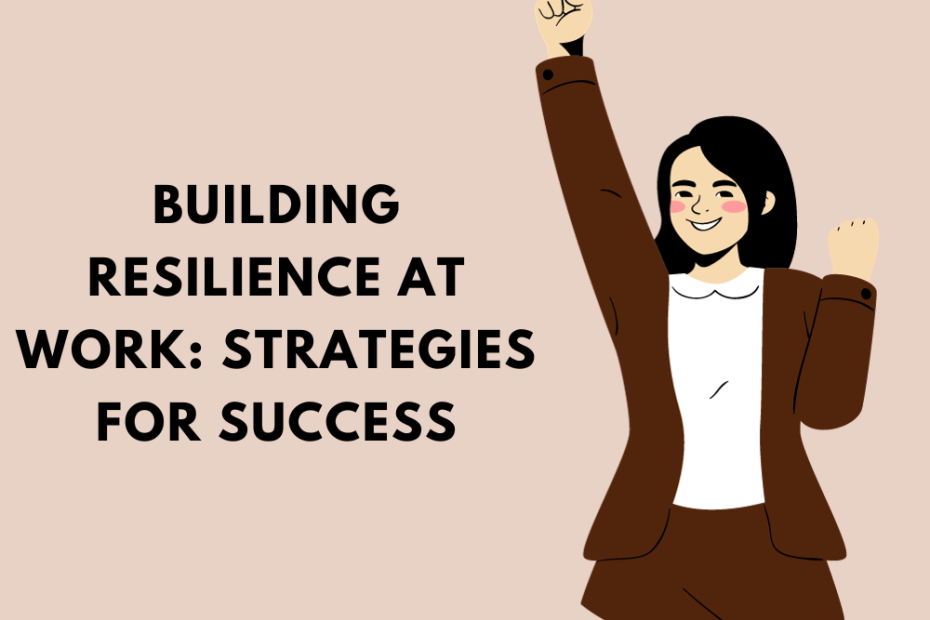In today’s fast-paced and demanding work environments, maintaining resilience is essential for success. It’s not just about being able to bounce back from setbacks, but also about staying motivated, adapting to change, and thriving in the face of adversity. Whether you’re a seasoned professional or just starting your career, this article will provide you with practical strategies to build resilience at work. From fostering a positive mindset to developing effective coping mechanisms, you will discover helpful tips and techniques that will empower you to overcome challenges and thrive in your professional journey.
Building resilience at work: Strategies for success
In today’s ever-changing and demanding work environment, it is essential to develop resilience as a key attribute for success. Resilience refers to the ability to bounce back from setbacks, adapt to challenges, and maintain mental and emotional well-being in the face of adversity. By understanding resilience and implementing strategies to build it, you can enhance your ability to thrive in the workplace.
Understanding resilience
Resilience is not about being immune to stress or difficulties; instead, it is the capacity to recover quickly from setbacks and setbacks. It involves having a positive mindset, emotional intelligence, problem-solving skills, and the ability to manage stress effectively. Resilient individuals are more adaptable, confident, and better equipped to handle the pressures of work life.
The importance of resilience at work
Resilience is a crucial skill to possess in the workplace because it enables individuals to navigate tough situations with grace and composure. In a fast-paced and competitive work environment, setbacks are common, and the ability to recover from these setbacks quickly can make a significant difference in one’s professional growth and success. Resilient individuals are more likely to maintain focus, stay motivated, build healthy relationships with colleagues, and effectively manage work-related stress.
Recognizing signs of low resilience
It is important to recognize the signs of low resilience at work to address and overcome them. Common signs include feeling overwhelmed by workload, frequently experiencing burnout, difficulty in bouncing back from setbacks, decreased motivation, difficulty in handling criticism or feedback, and strained relationships with colleagues. If you notice any of these signs, it might be an indication that you need to work on building your resilience.
Developing a positive mindset
Cultivating a positive mindset is a foundational step in building resilience at work. By focusing on the positive aspects of your work and reframing challenges as opportunities for growth, you can train your brain to approach difficulties with optimism. Incorporating affirmations, gratitude practices, and mindfulness techniques can also help in nurturing a positive mindset and building resilience.
Building emotional intelligence
Emotional intelligence plays a vital role in resilience-building. It involves understanding and managing emotions, as well as empathizing with others. By developing emotional intelligence, you can enhance your ability to handle stress, build effective relationships, and communicate assertively. Practicing self-awareness, self-regulation, motivation, empathy, and social skills can contribute to developing emotional intelligence and resilience.
Improving self-care practices
Taking care of oneself is essential for building resilience at work. Engaging in self-care practices such as regular exercise, healthy eating, getting enough sleep, and taking breaks can improve physical and mental well-being. Setting boundaries to maintain work-life balance, practicing relaxation techniques, and pursuing hobbies or interests outside of work can also contribute to overall resilience and reduce the risk of burnout.
Fostering strong social connections
Building and nurturing strong social connections at work is another key aspect of resilience-building. Cultivating positive relationships with colleagues, mentors, and supportive individuals can provide emotional support during challenging times. Engaging in team-building activities, networking, and seeking opportunities to collaborate with others can help in fostering these connections, contributing to increased resilience in the workplace.
Enhancing problem-solving skills
Resilient individuals possess strong problem-solving skills, enabling them to find effective solutions to challenges and setbacks. Developing a structured approach to problem-solving, seeking different perspectives, and being open to feedback or alternative solutions can improve your problem-solving abilities. By continually honing these skills, you can become more adaptable, resourceful, and better equipped to handle unexpected situations at work.
Adopting a growth mindset
A growth mindset is a belief that abilities and intelligence can be developed through effort and perseverance. Embracing a growth mindset fosters resilience by encouraging a willingness to learn from failures and setbacks. It allows you to view challenges as opportunities for growth and to approach them with an open mind. By adopting a growth mindset, you can bounce back from setbacks more effectively and continually develop your skills and abilities.
Utilizing stress management techniques
Effective stress management is crucial for building resilience at work. Developing strategies to cope with work-related stress can help you navigate difficult situations more effectively. Some stress management techniques include deep breathing exercises, mindfulness meditation, prioritizing tasks, taking short breaks, delegating when possible, and seeking support from colleagues or supervisors. Implementing these techniques can help you manage stress, maintain focus, and build resilience in the face of pressure.
Creating a supportive work environment
Lastly, fostering a supportive work environment is essential for building resilience. Organizations that prioritize employee well-being, provide opportunities for growth and development, encourage open communication, and promote work-life balance contribute to a culture of resilience. By creating such an environment, employees feel valued and supported, leading to increased resilience and overall job satisfaction.
In conclusion, building resilience at work is a journey that requires intentional effort and practice. By understanding the importance of resilience, recognizing signs of low resilience, and implementing strategies such as developing a positive mindset, building emotional intelligence, improving self-care practices, fostering strong social connections, enhancing problem-solving skills, adopting a growth mindset, utilizing stress management techniques, and creating a supportive work environment, you can enhance your ability to thrive in the workplace and achieve long-term success. Remember, resilience is not only about bouncing back; it is about bouncing forward and growing stronger through adversity.
